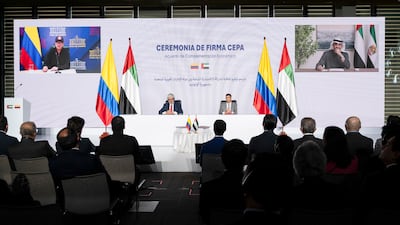The UAE signed its 11th Comprehensive Economic Partnership Agreement on Friday as it continues to focus on boosting economic and trade ties with different countries.
The Arab world's second-largest economy signed a new Cepa with Colombia after reaching a similar agreement with Costa Rica on Thursday, state news agency Wam reported on Friday.
The UAE has so far concluded Cepas with India, Turkey, Israel, Indonesia, Cambodia, Georgia, as well as with Mauritius, Kenya, the Republic of Congo, Colombia and Costa Rica.
The country is expected to exceed its initial target of signing 26 Cepas because of its pace of work and interest from other countries, Dr Thani Al Zeyoudi, Minister of State for Foreign Trade, told The National in March.
Cepas help to cut tariffs and remove most trade barriers between countries in a move intended to boost investment.
“The UAE-Colombia Cepa will open a promising new chapter in deepening economic ties between the two nations, enabling businesses to benefit from access to not only to each other’s markets but also their respective regions,” said President Sheikh Mohamed, who witnessed the signing of the agreement along with the Colombian President Gustavo Petro.
The UAE and Colombia have continued to bolster economic ties, with non-oil trade between the two countries rising by 43 per cent in 2023 to reach a record $53.1 million, more than double the total achieved in 2021.
The two countries have also signed co-operation agreements in renewable energy, environment, hydrogen, travel, free zones and artificial intelligence.
“UAE and Colombian ports and our peoples may embrace in friendship, solidarity and goodwill, which is what can actually save humanity,” Mr Petro said.
The new Cepa comes at a time when the Emirates is seeking to boost non-oil foreign trade to more than Dh4 trillion ($1 trillion) by 2031 amid new trade agreements with different countries and economic diversification plans.
The UAE's non-oil foreign trade hit a record Dh3.5 trillion in 2023, up from Dh2.23 trillion in 2022 as the country's trade with its top 10 most important foreign partners grew by 26 per cent last year.
Non-oil trade with Turkey, which contributed 5.1 per cent to the UAE's total, grew by 103.7 per cent year on year in 2023, the highest among the top 10 trading partners. This came after the two countries brought their Cepa into effect in September.
Trade with India, which signed a Cepa with the UAE in May 2022, grew by 3.9 per cent, accounting for more than 7.6 per cent of the total trade, the Emirates announced in February.
The UAE also moved up on Kearney’s 2024 Foreign Direct Investment Confidence Index, jumping into eighth place, from 18th, amid a diversification push.
It came second on Kearney’s emerging market index – behind China, the world’s second-largest economy – rising from third last year.
The country's economy is expected to grow by 4.2 per cent this year, according to the UAE Central Bank.
The UAE posted a record FDI of about $23 billion in 2022. Official figures for last year have yet to be released.


